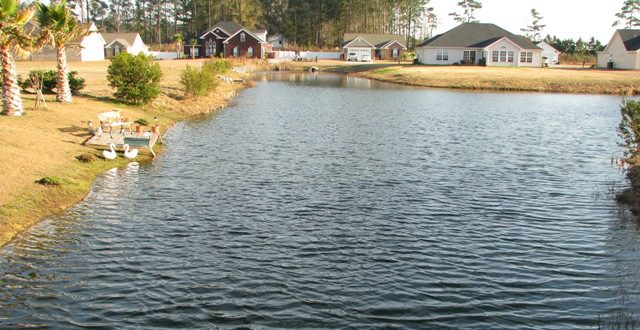CHARLESTON — As South Carolina braces for Hurricane Florence’s potential landfall, Clemson Cooperative Extension agents are offering reminders and resources for maintaining and preparing stormwater ponds in the event that severe weather strikes.

“Stormwater ponds are probably the most frequently used practice in our communities to help manage flood events. It is essential that residents do what they can to protect their function so that they are able to manage these large flooding events without impacting residents’ properties and roadways,” said Guinn Wallover, Extension Water Resources Program Team member in Berkeley, Charleston and Dorchester counties.
With that, Extension agents say there are simple steps residents can take before a storm to help ensure that there is nothing inhibiting the flood management capabilities of stormwater ponds, which are designed to receive runoff and mitigate flooding.
“People tend to forget that is their purpose, and they often think they’re just aesthetic features,” said Amy Scaroni, program coordinator for Carolina Clear, Clemson Extension’s statewide stormwater education program. “So they could be temporarily managing them in a way that’s not allowing the capacity for additional flood waters coming in. That’s one of the reasons we want to give these tips to make sure that the ponds aren’t overly full before a storm comes and that extra runoff has nowhere to go.”
First, make sure that all inlets and outlets, which control flow moving into the pond and flow moving out, are clear of vegetation, sentiment or debris that could block flow into and out of the pond.
“That’s probably the number one thing they can do,” Wallover said.
Next, community residents should ensure that storm drains and ditches around neighborhoods are clear to allow water to flow smoothly to the stormwater pond designed to receive it.
“Often during dry weather, storm drains can get blocked with leaves and lawn debris, or sometimes people dump things down there that they are not supposed to,” Scaroni said. “When a big rainstorm comes you want the water to smoothly flow into the storm drain. If they are blocked, you could end up with localized flooding on your streets and throughout the neighborhood. And the same thing with ditches, which can fill in with sediment and vegetation and may have less capacity to channel water downstream than they are designed for.”

Some large stormwater ponds or reservoirs, particularly ones in inland locations off the coast, have dams that are regulated by the S.C. Department of Health and Environmental Control (DHEC). Pond owners who are unsure what actions to take to ensure their dam is safe should contact the DHEC Dams and Reservoirs Safety Program with questions.
Extension agents also advise that residents preparing for a large storm take the proactive step of bagging any yard waste and debris around their properties to prevent them being carried by the storm water directly down the storm drain.
“A lot of our ponds performed pretty well in the past few storms, but I’ve seen situations where people who have put wood up in front of their pond’s outlet to create a higher pond level, or that they’ve been dumping down the drain and it has inhibited flow,” Wallover said. “So if there was a hurricane on top of those situations, it can really cause a lot of damage in the community.”
Scaroni added: “Sometimes when people block flow out of a pond to raise the water level, they tend to do that because they don’t like the look of a pond where the water level is low and you just see dirt below the pond bank. But that isn’t advisable in the event of a major storm.”
The Extension experts also offered a number of online resources for residents who need more information on problem-solving for stormwater ponds and management recommendations.
- Clemson Extension’s S.C. Stormwater Pond Management website
- Clemson Home & Garden Information Center fact sheets
- South Carolina Coastal Information Network Flood Resources Guide (link to download PDF)
- DHEC Dam Safety program
Get in touch and we will connect you with the author or another expert.
Or email us at news@clemson.edu

